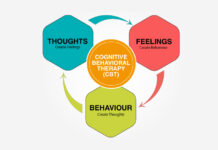
It’s true: andropause exists. But are men on the verge of a nervous breakdown?
by dini cohen, ba, rhn
For all the male gynecologists out there who say they can sympathize when a woman goes through a “change of life” otherwise known as menopause, we believe you. There are some men who experience the same symptoms as perimenopausal and menopausal women. If your hubbie is experiencing fatigue, depression, decreased sexual libido, problems sleeping, increased body fat and reduced strength, he might not just be ‘syncing up’ with you, but actually going through his own “change of life,” otherwise known as andropause.
What is it?
Unlike women who cease menstruation within a set time frame, usually in their mid-40s to 50s, a man’s timeframe is a little more blurred and can continue over decades, making andropause that much harder to diagnose and unravel. After the age of 30, testosterone levels decrease slowly, about 10 percent per decade and by the age of 70, men have about 50 percent the testosterone they did when they were younger. Approximately 30 percent of men will see declining levels as early as their mid-40s to 50s, mainly resulting from psychological stress, alcohol, injuries or surgery, medications, obesity and infections.
What happens?
Testosterone to men is like estrogen to woman. Besides playing a role in sexual function, it helps to build protein and affects metabolic activities such as production of blood cells in the bone marrow, bone formation, lipid metabolism, carbohydrate metabolism, liver function and prostate gland growth. There are other silent symptoms you need to be aware of, mainly the risk of cardiovascular disease and osteoporosis.
It is a well-known fact that as women go through menopause, they increase their chance of heart disease. New evidence suggests that a similar phenomenon occurs in men as their testosterone levels diminish with age. Clinical findings point to an association between low testosterone levels and an increase in cardiovascular risk factors in men. A cause and effect relationship has not yet been established in large clinical trials and further clinical research is needed into this important area of study.
Some simple changes can make both you and your partner a lot happier:
Eat clean – A variety of fruits, vegetables, whole grains and lean proteins will provide you with the nutrients and phytochemicals to keep your immune system strong.
Get moving – At least 30 minutes of exercise per day boosts your immune system, helps you sleep better and helps maintain your energy, strength and lean muscle mass.
Bone up – Eat calcium-rich foods like yogurt, collard greens and legumes. If you cannot get enough dietary calcium, consider supplementation. Aim for a daily intake of 1,000-1,200mg. If you are on HRT or have a history of kidney stones, speak to your doctor about supplementing with calcium.










